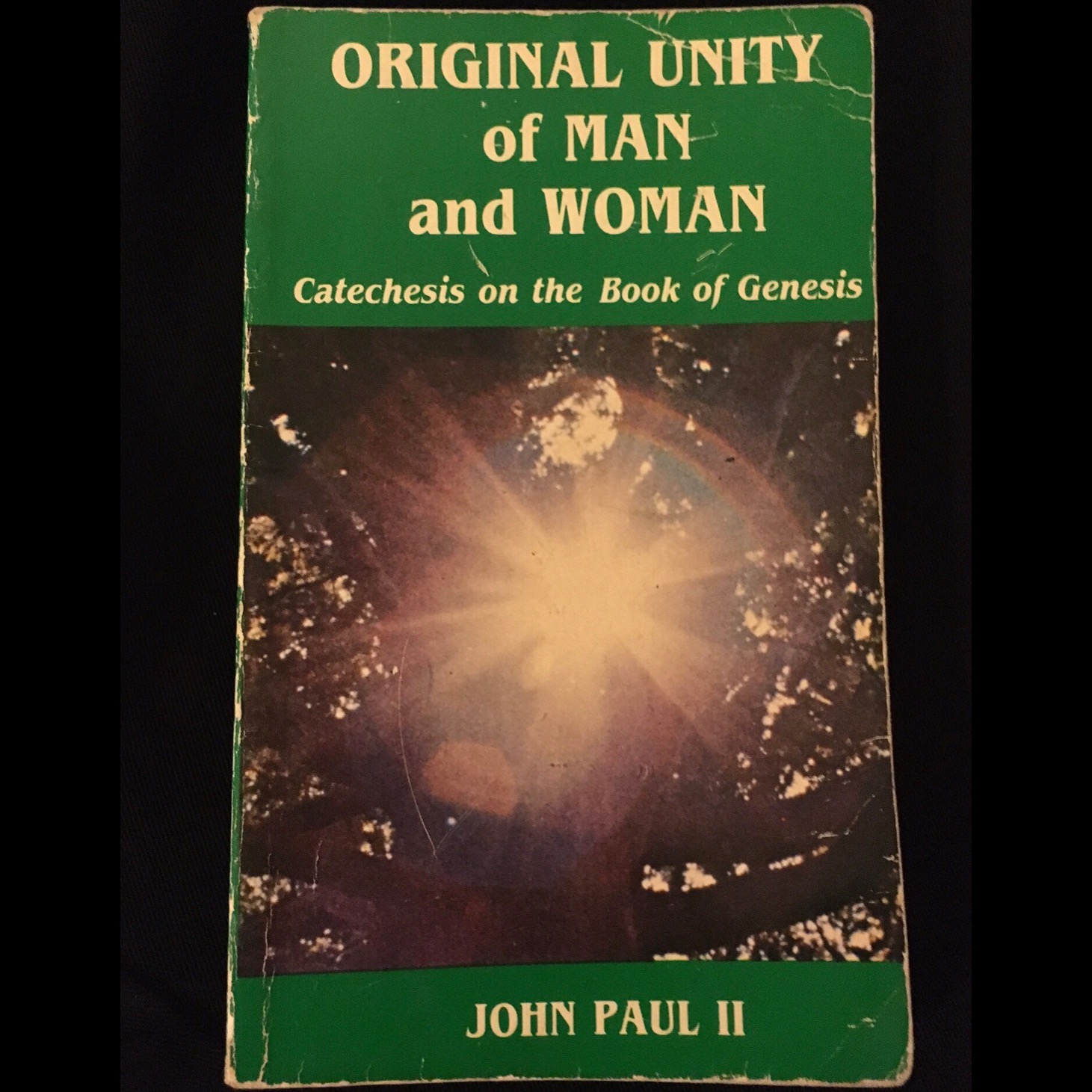This week, I vividly recall my first attempt to read Pope John Paul II’s “theology of the body.” In those days (around 1994) it was published as four little books, so I trotted down to the bookstore at Franciscan University of Steubenville (a mile from my home) and purchased the first one, entitled “Original Unity of Man and Woman” (photo note: this is the actual copy I purchased 24 years ago!). Since I already had my theology degree from Franciscan U, I dove right in. Piece of cake, I thought. A couple lengths of the pool later, I read and reread the same paragraph 3 times, shook my head and thought: I have a theology degree, and I have absolutely no idea what John Paul II is talking about. (Ever felt that way reading JP2?)
Fast forward a year or so, and I again trotted down to Franciscan U’s bookstore, this time to purchase JPII’s apostolic letter, “On the Dignity and Vocation of Women.” Again, I dove in, but this time my immersion was a swimming success! I lapped up the entire document, not once, not twice, but three times I was so captivated by it.
Why did I gobble up this book? Because, in contrast to the theology of the body’s dense and overly-meaty style, this was in bite-sized, digestible pieces. And I relished one word in particular: gift.
It’s no exaggeration to say this four-letter word changed my life – and continues to change my whole way of living the body. Which brings me back to last week’s blog post: How did your experiment go? Did you take note for a day of how your bodily actions expressed your person? What did they reveal to you about you?
Fortunately, you don’t have to divulge your answer in the comments section. However, my hope is that if you followed me around for a day and watched the “language of my body,” you would discover that my deepest identity is “gift.”
At the time I read “On the Dignity and Vocation of Women,” I didn’t feel like a gift. I felt more like a failure and a ball of constant stress. I was navigating the ending of a 10-year marriage and coping with life as a single, working mom, living barely above the poverty line. And yet in the midst of my crushed identity, John Paul II introduced this simple word that shifted the paradigm of my life and my identity forever: gift.
Here’s the exact phrase that rocked my world: “To say that man [meaning the human person] is created in the image and likeness of God means that man is called to exist ‘for’ others, to become a gift.” It was so simple, almost like breathing. If I am created in the image and likeness of God (see Gen 1:27) then that means I am created to be a gift.
Armed with the vocabulary I learned from “On the Dignity and Vocation of Women,” I went back to the theology of the body and began reading and understanding it in earnest. There, I discovered the beautiful image of Genesis 2:22 where God creates Eve and presents her as gift to Adam. Eve’s first presence in the world as a woman is as gift!
Of course it might be easy to translate this into a false and vain understanding that I am God’s gift to the world. However, in JPII’s accounting, every person comes into the world as gift. Or put another way: we are created as a gift to be a gift. For instance, the actions of my body reveal that I am a gift when I wash the dishes for my roommate; listen to a friend for an hour on the phone as she sifts through anger and grief; lead a women’s faith-sharing group in my home for young-adult women even on the evenings when I want to fold up shop and just go to bed. Yes, I am God’s gift to the world because that’s my human identity and that is what my feminine body reveals.
I am often struck these days as how the real issue facing us in terms of multiplying gender expressions and redefining marriage involves the meaning of embodiment. I touched on this last week in the sense of asking, Why do you have a body anyway? Besides the fact that your body reveals the kind of person you are by your actions, your body also reveals that you were created as a gift to be a gift.
Hang with me for just a couple paragraphs more. Your body reveals that you were created as a gift to be a gift not as a generic body, but precisely as male or female. Masculinity and femininity are not two separate realities – like cats and dogs – and so its expression can be multiplied – cats, dogs, elephants, giraffes, zebras – into an endless number of variations. Rather, masculinity and femininity constitute a singular reality – human nature – that is expressed in two and only two ways.
Why does this have to be so? Why can’t we “evolve” beyond two ways of being human? Why can’t there be a third way, or fourth way, or fifty-two ways?
The answer is meaning. Femininity and masculinity have a meaning that is not like playing Jenga where you can pull out one block and the whole tower stays standing. Instead, masculinity and femininity are like playing Jenga where you pull out one block and the whole structure collapses. If we change the meaning of male and female the whole structure of reality implodes.
Forgive me, please. I am not being apocalyptic. I’m being realistic. And it’s not because the human race will die out (although that could happen). It’s because male and female represent the meaning and purpose of every human person’s life and the meaning of our embodiment, which is to make a total gift of self in love that includes the body. So this week, think “total gift of self in love through the body,” and remember…you are a gift!
© Katrina J. Zeno, MTS




